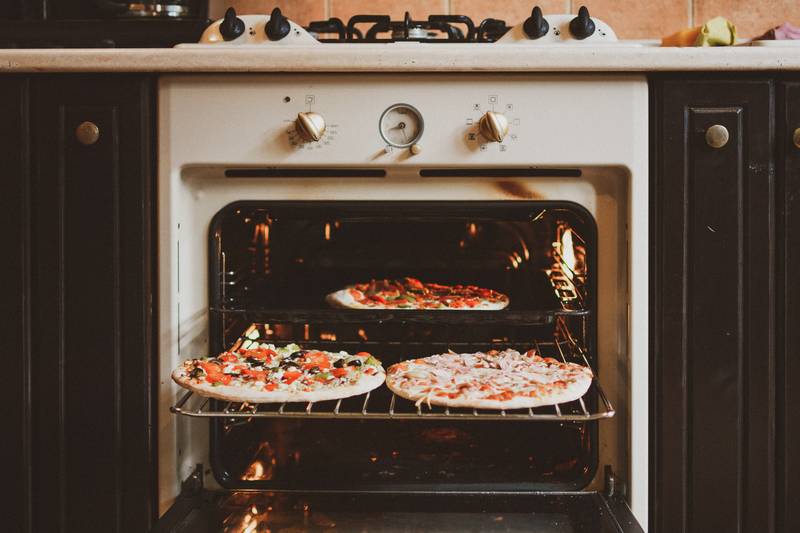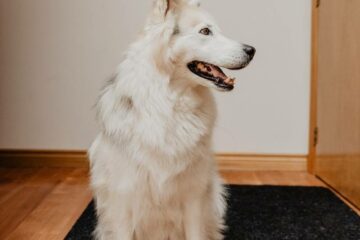Why Is My Dog Scared of the Oven? (+How to Stop Barking!)
“Why is my dog scared of the oven?” Have you noticed your dog acting afraid of the stove, or maybe even getting riled up by it? In this article, we’ll explain why your dog is afraid of the oven and share tips on how to stop them from barking at it.
We’ve got a lot of ground to cover, from discussing why your dog shakes when you cook, to figuring out why your dog is afraid of the oven all of a sudden. We’ll even answer the question: “Can dogs hear the oven?” So, if your dog is showing signs of oven anxiety, keep reading below to find out how to help them!
Dog Barks at Oven: How to Stop

To stop your dog barking at the oven, use strategies such as distraction, positive reinforcement, training commands (like “quiet”), and gradually desensitizing your dog to the oven’s sounds and sights. Patience, consistency, and a calm demeanor are crucial in this process.
- Distracting Your Dog: When your dog starts barking at the oven, you can distract them with a favorite toy or a treat. It’s a way of redirecting their attention away from the oven and breaking the cycle of barking.
- Positive Reinforcement: Reward your dog for calm behavior around the oven. This could be when they choose to ignore the oven’s sounds or even when they stop barking on command. You can use treats, praise, or petting as a form of reward, which helps your dog associate positive experiences with the oven’s presence.
- Teaching the ‘Quiet’ Command: Training your dog to understand and obey the “quiet” command can be incredibly useful.
- First, wait for your dog to start barking, then say “quiet” in a firm but calm voice. It’s important not to shout, as this could make your dog more agitated.
- When your dog stops barking, reward them with a treat and praise. This helps them associate being quiet on command with positive feedback.
- Repeat these steps regularly, increasing the duration your dog needs to be quiet before they receive a treat.
Consistency is key with this method, as your dog needs to understand that “quiet” always means they should stop barking.
- Gradual Desensitization: Gradual desensitization involves slowly exposing your dog to the oven in non-threatening, controlled circumstances. You can start by having the oven off and rewarding your dog for being calm around it. Gradually progress to turning the oven on for short periods, continuing to reward calm behavior. Over time, your dog should become less reactive to the oven.
These steps will get your dog to stop barking at the oven, but it’s important to remember that the underlying behavioral issues (anxiety, overexcitement) that were causing all of this to begin with will still be present. And until you address them, any positive changes you see are only going to be temporary.
“Well, how do I make these changes last then?”
By getting your dog to truly choose to follow your direction, that’s how. I tried many times to write out how you can do that before deciding it made more sense to just link you to the free video series that explains it better than I’d ever be able to.
The series is by a man named Dan who is one of the world’s leading dog obedience trainers. In it, he teaches you how to put an end to things like when your dog barks at the oven and all other misbehavior using his fast and easy-to-follow methods.
In the first video, Dan will reveal to you why the two most common methods of dog training only doom you to failure. You can watch the video now by clicking here. Follow the proven system he’ll show you in his series and you’ll never have to spend another second worrying about your dog barking at the oven ever again!
My Dog Shakes When I Cook

If your dog shakes when you cook, it’s likely due to noise sensitivity, fear of kitchen appliances, or anxiety associated with food preparation. Understanding your dog’s specific triggers and taking measures to alleviate their discomfort can help curb this behavior.
Noise Sensitivity
Dogs have a heightened sense of hearing and can be sensitive to loud noises. The clattering of pots and pans, the whirring of a blender, or the sizzling of a stovetop can be stressful for them. This noise sensitivity can make your dog anxious and lead to physical responses such as shaking. Using quiet kitchen appliances or reducing the overall noise levels during food preparation can help manage this.
Fear of Kitchen Appliances
The sight, sound, or even the smell of certain appliances can make your dog nervous and suddenly afraid in the kitchen. For instance, an oven heating up or a toaster popping can startle them. Gradually desensitizing your dog to these appliances, when they’re turned off and cool, can help. Start by letting your dog observe them from a distance and gradually decrease the distance over time as your dog becomes more comfortable.
Anxiety Associated with Food Preparation
Some dogs might associate cooking with being left alone or not getting attention. Others might be anxious when you’re preparing food due to anticipation or a fear of missing out. Providing your dog with a safe space away from the kitchen, giving them a toy to play with, or feeding them their meal during your cooking time can help alleviate this anxiety.
When You Need to Help
If your dog’s shaking becomes a consistent pattern or if they exhibit other signs of distress such as excessive barking, hiding, or showing signs of aggression, it’s probably time to begin behavioral training with your dog. This will teach you how to address not only the problem itself but also the underlying issue driving it. Go back to the first section and we’ll explain how.
Conclusion: Understanding and Supporting Your Dog’s Needs
A dog shaking during cooking is often a sign of anxiety or discomfort. By understanding the triggers and working on methods to alleviate the fear or anxiety, you can create a more relaxed environment for your dog. Remember, patience and consistency are key. You may need to address an underlying issue, which we explain in the first section.
Why Is My Dog Afraid of the Oven?
If your dog is afraid of the oven, it’s likely due to the unfamiliar noises, heat, and smells it produces, or a negative past experience associated with it. To alleviate their fear, understanding the underlying cause and applying appropriate desensitization techniques and positive reinforcement strategies can be highly effective.
Understanding the Fear
- Noises: Ovens can make a variety of sounds such as the ticking of the timer, the fan’s hum, or the hissing and popping sounds when cooking. Dogs have sensitive hearing, and these unfamiliar sounds may startle or scare them. This reaction can be particularly prominent in dogs that are generally noise-sensitive.
- Heat: Ovens generate heat, and some dogs may be sensitive to this. Dogs detect changes in temperature more acutely than humans, and an increase in temperature when the oven is in use might cause discomfort or fear.
- Smells: The aromas coming from the oven, especially when cooking, can be overwhelming for your dog’s highly sensitive nose. Certain scents may not be pleasant to them and could induce fear or anxiety.
- Past Negative Experience: If your dog had a negative experience involving the oven – perhaps they got too close and felt the heat, or a loud noise gave them a scare – this could result in a persistent fear of the oven.
Addressing the Fear
Understanding why your dog is scared of the oven can help you better address their fear. It’s advisable to create a positive association with the oven by rewarding calm behavior around it and using techniques of desensitization and counter-conditioning. Here’s how:
- Positive Reinforcement: Reward your dog for calm behavior around the oven. This can be when the oven is off and eventually when it’s on. Use treats, praise, or petting, so your dog begins to associate good experiences with the oven.
- Desensitization: This process involves exposing your dog to the oven gradually. Start with the oven off and reward calm behavior. Slowly progress to turning the oven on for short periods, continuing to reward calm behavior. Over time, your dog should become less reactive to the oven.
Remember, it’s important to be patient and persistent. Every dog responds at their own pace, and forcing the process could result in more fear or anxiety. If your dog’s fear continues or if it causes significant distress, go back to the first section where we’ll explain how to treat the underlying issue.
Dog Scared of Oven All of a Sudden
If your dog is scared of the oven all of a sudden, it might be due to a loud noise or heat emanating from the oven, changes in the environment, or a traumatic event associated with the oven. Understanding these triggers and providing a reassuring environment can help your dog overcome this fear.
Noise or Heat from the Oven
Dogs have heightened senses and can be sensitive to noises and heat. The sound of a preheating oven, a timer going off, or the oven door closing can startle them. Similarly, the heat from the oven might make them uncomfortable. Using the oven gently, and ensuring your dog is at a safe distance when the oven is in use can help mitigate these fears.
Changes in the Environment
Changes in the environment can also lead to sudden fears in dogs. If you’ve moved your oven or rearranged your kitchen recently, your dog might be reacting to these changes. Giving your dog some time to adjust to the new setup or reintroducing them to the kitchen gradually can help ease their anxiety.
Traumatic Events Associated with the Oven
A past negative experience associated with the oven, such as a burn or being startled by a loud noise, can trigger a sudden fear in your dog. In such cases, it’s essential to associate the oven with positive experiences. You can do this by rewarding your dog with treats and praises when they approach the oven calmly when it’s not in use.
When Fear & Anxiety Persists
If your dog’s fear of the oven persists or if they show severe signs of stress like shaking, drooling, or attempting to escape, it’s time to begin behavioral training with your dog. It will teach your dog confidence while also addressing the underlying problem that’s driving everything. Learn how to do this yourself in the first section.
Conclusion: Creating a Fear-Free Environment
A sudden fear of the oven in your dog can be disconcerting. However, with understanding, patience, and the right approach, you can help your dog overcome this fear. Remember, each dog is unique, and what works for one might not work for another. We explain more about how to help in the first section.
Dog Afraid of Oven: Can They Hear It?
Yes, dogs can hear the oven. Their heightened sense of hearing enables them to pick up sounds that humans may overlook, such as the hum of the oven’s fan or the ticking of its timer. Such unfamiliar noises could startle or scare them, leading to fear or anxiety. To help them overcome this fear, one can apply strategies such as positive reinforcement and desensitization techniques.
- Dog’s Superior Hearing: Dogs have an exceptional range of hearing, far superior to that of humans. They are capable of detecting sounds at a frequency range of approximately 40 Hz to 60,000 Hz, whereas humans can only hear within a range of about 20 Hz to 20,000 Hz. This means your dog can indeed hear the oven, including sounds that may not be perceptible to you.
- Unfamiliar Noises: Ovens can make a variety of sounds – from the humming of the fan, the ticking of the timer, to hissing and popping sounds when cooking. These sounds, which may go unnoticed by us, could be unfamiliar and intimidating to your dog, leading them to be scared of the oven.
- Addressing the Fear: Understanding why your dog is scared of the oven is the first step to helping them overcome this fear. Dogs respond well to positive reinforcement, so reward your dog for remaining calm in the presence of the oven. This can involve giving treats, praise, or affection whenever they behave calmly around the oven. Remember to start when the oven is off and gradually progress to times when it is on.
- Desensitization: Expose your dog to the oven gradually. Start with the oven off and reward your dog for staying calm. Slowly, turn the oven on for short periods while continuously rewarding calm behavior. Over time, this exposure will help your dog become less reactive to the sounds of the oven.
Remember, patience and persistence are crucial in this process. Every dog has its own pace and rushing the process could potentially increase their fear or anxiety. It’s important that you also address their underlying issues, which we explain how to do in the first section.
I’m sure you’re ready for your dog to quit barking at the stove, so I’ll let you get started on things now. Best wishes with everything, and thanks for reading our article “Why Is My Dog Scared of the Oven? (+How to Stop Barking!)”.





